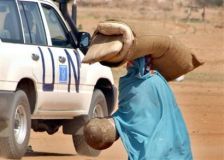What’s sought for Sudan and why
By WILLIAM M. REILLY
UNITED NATIONS, May 26, 2005 (UPI) — U.N. Secretary-General Kofi Annan said Thursday he was encouraged by expressions of support for international efforts to save Sudan from, basically, itself, after decades of civil war.

|
|
A displaced Sudanese woman carries her belonging as a U.N. vehicle passes at the Abu Shouk camp, in north Darfur, Sudan, Aug. 27, 2004. (AP). |
In the last two years alone in the Darfur region more than 2 million people have been displaced and nearly 200,000 deaths tallied. Some 3 million people were expected to need relief aid in the next few months and funding was $350 million short of what was required, said Annan, who is to soon visit Sudan, his first return to the area since last July
“Ultimately, it is the supreme obligation of the parties to end the conflict in Darfur,” the secretary-general told an Addis Ababa, Ethiopia, pledging conference. “It is the responsibility of the government, leaders and people of Sudan to ensure that viable and enduring peace is achieved.”
But why was the United Nations co-chairing the conference in the capital of neighboring Ethiopia with African Union Commission Chairman Alpha Oumar Konare when the AU was billed as the lead international organization to help bring stability to Sudan?
“To raise the profile and to symbolize the international community has its might behind the mission,” Stephane Dujarric, a spokesman at U.N. headquarters in New York, told United Press International. “It’s clear the AU mission is making a difference where they (AU troops) are present in Darfur and their role is going to be expanded.”
Undersecretary-General for Peacekeeping Operations Jean Marie Guehenno briefed the U.N. Security Council Wednesday and, later, reporters on his just-completed visit to the region, including Darfur.
“The situation needs to change. The African Union is making a remarkable effort and I think has brought major, major changes, but I think it obviously needs to go further,” he said. “I saw firsthand how just their presence in a number of places just changes the dynamics and makes a serious improvement.”
The U.N.’s chief peacekeeper said: “In the places where they are, indeed, the situation has improved. The presence of the AU troops creates a sense of confidence and security that is welcome.”
However, he added that in talking with internally displaced people in camps, “They are not prepared to return to their villages and that’s why the situation is not better and we will not be able to say the situation is better so long as we have these huge IDP camps which are really heartbreaking.
“There is an immense effort to feed these people, to give them some schooling, for the children,” said the undersecretary-general. “We have 2 million people pushed out of their villages. This is a horrible situation that needs to change and there is the responsibility of the government of Sudan to protect its people and to do the right things.
“When we met with officials in (the Sudanese capital of) Khartoum, we emphasized that message,” he added.
“On the military front it is important for the AU to get more support and that was a repeated message that I got from all levels from the commanders on the ground,” he said.
“They have now a precise list of what is needed,” from fixed-wing aircraft to bring in troops, trucks and helicopters to transport them and their supplies, including weaponry and personal body armor, and accommodations to provide what he described as “sustainability.”
While “assets” were most important, “money is welcome,” said Guehenno, adding there were “a little more than 2,500” AU troops in Darfur and 244 police, but “they are increasing.”
The AU Peace and Security Council has called for expansion of the AU Mission in Sudan, known by the initials AMIS, to 6,171 military personnel and 1,560 civilian police by the end of September.
The United Nations has said it is ready to assist the AU mission with military and logistics planning and technical advice, appeals for donor funding and logistics support, support in convening troop contributors, identifying police monitors and pre-deployment training for AU police and troops and police.
Personnel from the world organization already have begun working with AU staff on the concept of operations for the expanded African mission, but both agree “direct logistical support” for the AU should come from individual donors and not through the United Nations.
The troubles in the France-sized western Darfur region of Sudan surfaced in early 2003 with nomads pitted against so-called pastoralists, or as sometimes described as Arabs against Africans. But the situation was further complicated by tribal clashes and government-supported militias.
All this mushroomed into what U.N. Undersecretary-General Jan Egeland, the organization’s chief humanitarian coordinator, called the world’s worst humanitarian crises.
Talks over the Darfur conflict were to resume June 10 in Abuja, Nigeria.
Simultaneously with the upsurge of violence in Darfur, long-lasting talks between the government and rebels in southern Sudan were coming to a conclusion, and rebel leader John Garang, chairman of the Sudan People’s Liberation Movement, was expected to take a leadership role in the Khartoum government.
Annan was to visit Garang at his headquarters in Rumbek, Sudan, after meeting Sudan’s leaders.
